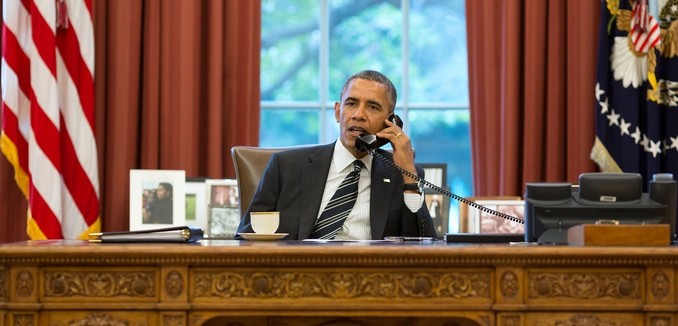President Barack Obama’s Middle East policy shows a consistent favoritism of Iran, according to an analysis written Monday by Michael Doran of the Hudson Institute.
Citing the 2006 report of the Iraq Study Group, Doran’s central thesis is that Obama has embrace the report’s conclusion that Washington should work more closely with Iran and Syria because “[t]hose two regimes, supposedly, shared with Washington the twin goals of stabilizing Iraq and defeating al-Qaeda and other Sunni jihadi groups.” Doran summed up the expectation that such an alliance would bring about.
In turn, this shared interest would provide a foundation for building a concert system of states—a club of stable powers that could work together to contain the worst pathologies of the Middle East and lead the way to a sunnier future.
Put a different way, Doran wrote that the rationale behind the policy was, “To rid the world of rogues and tyrants, one must embrace and soften them.”
Doran then analyzed a number of episodes of American-Iranian engagement during the Obama administration through the lens of this worldview.
The first incident was during the suppression of Iran’s fledgling “green” pro-democracy movement of 2009, who were protesting the fraudulent reelection of President Mahmoud Ahmadinejad. While Obama offered some rhetorical support for the pro-democracy movement, he “[maintained] a steady posture of neutrality.” But this did not prompt any diplomatic overtures from Tehran.
Later in 2009, however, it was discovered that Iran had built a hidden nuclear enrichment site at Fordow, in blatant violation of its Nuclear Non-Proliferation Treaty (NPT) obligations. With both Russia and France upset by this cheating, the P5+1 nations worked out a deal whereby Iran would ship its enriched uranium to Russia for reprocessing into fuel rods, that can’t be used for a nuclear bomb. But in early 2010, Iran signed a deal with Turkey and Brazil reneging on the deal it had tentatively agreed to with the West.
It was in the wake of this betrayal that Obama reluctantly signed the Comprehensive Iran Sanctions, Accountability, and Divestment Act (CISADA), which “would prove more painful to Iran than any previous measure of its kind.”
At the center of Obama’s strategy to engage Iran was the effort to conclude a nuclear agreement with the Islamic Republic.
In order to do keep this process alive, Doran writes, “Obama prevented Israel from attacking Iran” and “preserved American freedom of action with regard to Iran’s nuclear program.” But Israel wasn’t the only traditional ally whose concerns about Iran Obama dismissed. Saudi Arabia was also worried, and the late King Abdullah “had made his top regional priority abundantly clear when, according to leaked State Department documents, he repeatedly urged the United States to destroy Iran’s nuclear program.”
In 2012, as American allies grew increasingly concerned with the carnage in Syria, top administration officials put together a plan for aiding moderate rebels, but Obama rejected these plans. Doran attributes this to the president “[showing] the same deference to the Iranian interest in Syria.” Subsequently in 2013, after the regime of President Bashar al-Assad gassed civilians, violating a red line set by Obama, the president refused to take military action. Doran wonders if the reason for Obama’s about-face about the use of force had been a “fear of scuttling the biggest—and still secret—foreign-policy initiative of his second term, possibly of his entire presidency?” – diplomatic engagement with Iran.
The president has also shown deference to Iran when forming policy to counter the rise of the Islamic State of Iraq and Syria (ISIS). Doran recounts that in a Senate hearing, Secretary of State John Kerry was asked about weaknesses in the administration’s plan for fighting ISIS, and suggested that Iran and Syria could help:
Kerry stunningly suggested that the gaps would be filled by . . . Iran and Assad. “[Y]ou’re presuming that Iran and Syria don’t have any capacity to take on” Islamic State, Kerry said. “If we are failing and failing miserably, who knows what choice they might make.”
Recent reports in The Daily Beast and Bloomberg View have underlined the problems of seeking Iranian help to fight ISIS: It strengthens Shi’a fighters, which not only gives ISIS rhetorical strength when framing their mission as a Sunni-led fight against sectarian Shi’a oppression, but also gives direct support to Iranian militias like the Islamic Revolutionary Guard Corps, which has repeatedly attacked American allies.
The administration’s efforts as outlined by Doran show that the administration has pursued diplomatic engagement with Iran even at the expense of American’s allies and long-term interests.
Omri Ceren, The Israel Project’s Managing Director of Press and Strategy, summarized Doran’s argument to Mary Kissel of The Wall Street Journal. (Video embedded below.) The Israel Project publishes The Tower.
It’s emerged in the last, you know, six months, one year … people are saying listen … for a long time the right has criticized President Obama for an incoherent foreign policy. On one hand he would back traditional American allies Israel, Saudi Arabia, the Egyptians, the Jordanians on one hand, on the other hand he would seek to engage Iran and that was seen as incoherent. Now you’ve entered a very, very strange kind of period in the foreign policy discussion, which is a lot of people are beginning to … So we’re talking about scholars across the political spectrum. So everybody from Michael Doran formerly of Brookings now with Hudson, Tony Badran the Lebanese Christian who is a thinker at the Foundation for Defense of Democracies … Lee Smith who is also at Hudson now … these are people who are saying now reconstruct the president’s foreign policy over the last half-decade and what you see is not incoherence, it’s something that the President really began speaking about as a candidate before he was elected, engagement with Iran until the point where the Islamic Republic emerges, and now I’m using the president’s … phrase, as a ‘successful regional power’.
[Photo: The White House / Flickr ]




